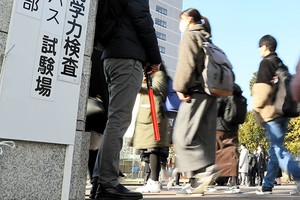Vox Populi, Vox Dei is a daily column that runs on Page 1 of The Asahi Shimbun.
July 27, 2021 at 13:01 JST
 Traditional structures and modern buildings are seen in Liverpool, England, in 2017 before the area lost its registration as a World Heritage site. (Asahi Shimbun file photo)
Traditional structures and modern buildings are seen in Liverpool, England, in 2017 before the area lost its registration as a World Heritage site. (Asahi Shimbun file photo)
The British city of Liverpool prospered from trade during the Industrial Revolution of the 18th and 19th centuries. Cotton from the United States was unloaded at the port of Liverpool and transported to nearby industrial cities.
The families of The Beatles, whose members were Liverpudlians, carried traces of that history. According to "Beatles Toshi-ron" (The Beatles urbanism) by Toshinobu Fukuya, John Lennon's father was a sailor and so was George Harrison's father at one time, while Paul McCartney's father was a cotton salesman.
The port of Liverpool was also a base of the slave trade. Even though that is a negative legacy, I believe it was natural that some sectors of central Liverpool were registered as UNESCO World Heritage sites in 2004.
Last week, however, the UNESCO World Heritage Committee revoked the registration, reportedly on the grounds that the value of the city's historic legacy has been diminished by redevelopment projects that are in progress.
Contemporary glass-and-steel structures have been built and a new soccer stadium is being planned for construction.
But for Liverpool today, it was probably inevitable that the city should seek rejuvenation through urban renewal. In Britain, London continues to thrive as the nation's financial hub, while former industrial areas have been languishing as of late.
UNESCO has deleted two World Heritage registrations to date.
One of the cases was in an old German city where the construction of a bridge to relieve traffic backups was considered a problem. Another was in Oman, where a wildlife sanctuary was downscaled.
It appears that making the UNESCO World Heritage list is no guarantee that the status will be permanent.
Liverpool has a small street named Penny Lane, immortalized by The Beatles in a song of that title. I was thrilled to visit it once.
I just hope the city will at least spare that neighborhood from tall buildings and other structures.
--The Asahi Shimbun, July 26
* * *
Vox Populi, Vox Dei is a popular daily column that takes up a wide range of topics, including culture, arts and social trends and developments. Written by veteran Asahi Shimbun writers, the column provides useful perspectives on and insights into contemporary Japan and its culture.




















A peek through the music industry’s curtain at the producers who harnessed social media to help their idols go global.
A series based on diplomatic documents declassified by Japan’s Foreign Ministry
Here is a collection of first-hand accounts by “hibakusha” atomic bomb survivors.
Cooking experts, chefs and others involved in the field of food introduce their special recipes intertwined with their paths in life.
A series about Japanese-Americans and their memories of World War II